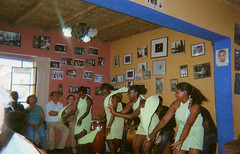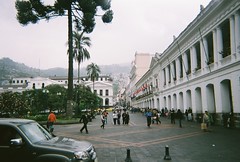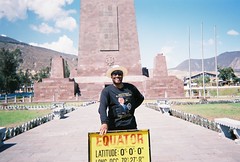I was on a local bus when I stepped passed a group of Mexican-American high school students conversing in Spanish. I politely said, “con permiso (excuse me)” as I passed, and they fell out laughing; not believing their ears; a black man (a pinche mayate) speaking to them in Spanish. When I snapped in annoyance, “¿qué es chistoso? (what the hell is so funny? They became very quiet, but kept their eyes on me in disbelief.

Vicente Guerrero, son of an African slave mother and a Mestizo father grew up to be Mexico's liberator before becoming Mexico's president and abolishing slavery.
Months later, a similar incident happened on that same bus line when I offered my seat to a woman engaged in a Spanish-speaking conversation. Again, the same reaction; loud, boisterous laughter. They too could not believe their ears; a black man speaking to them in Spanish. Irritated, I began to lecture them (in Spanish) on people of African heritage throughout Latin America who, unlike I, speak Spanish as a first language. I later learned that they too are Mexican-Americans.

Gasar Yanga, who's statue today stands outside the town of Yanga, Vera Cruz, México was assisted by another Black Mexican, Francisco de la Matosa, in establishing the first free black town in the western world after conducting guerrilla warfare against the Spanish.
I've even met Mexican nationals who are totally oblivious to black heritage in their own country. Historian Ted Vincent calls it racial amnesia. A married couple who were in my office from Mexico's Port of Vera Cruz were utterly astonished when I told them about African slave trade and slave revolts in their home state during the 14th and 15th centuries.
The late professor of anthropology at the University of Veracruz in México, Gonzalo Aguirre Beltrán, wrote in his book, “La Poblacion Negra de México (The Black Population of México)” that more than 500,000 African slaves were brought into México between 1523 and 1810, the year of México's independence.

After more than 400 years of interracial marriages, the black presence in México is not nearly as noticeable as those of Cuba, Colombia, or even Perú. Many Mexicans have been known to stubbornly deny any existence of African blood in their own family tree, let alone in the Mexican population at large.
Yet, according to research done by Stanford University's cultural anthropologist Bobby Vaughn, the black population in México was up to three times as large as that of the Spanish during colonial times. The Schomburg Center for Research & Black Culture states that 75% of Mexican people have African strains in their bloodlines.
“The Black La Raza”
The African Presence in Mexico
National Museum of Mexican Art
Black Mexico Homepage
African History in Vera Cruz, Mexico
The Soul of Mexican Independence
Afro-Mexico
























